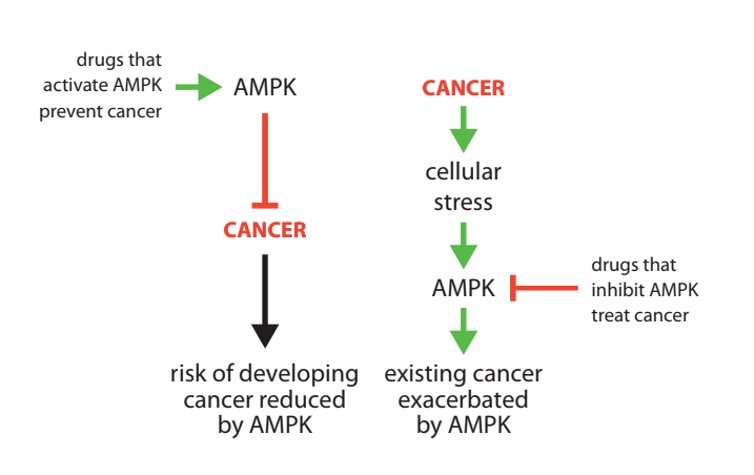Cancer's 'good cop/bad cop' protein could help develop more effective drugs

The basic unit of all living things is the cell—and the human body contains tens of trillions of them. Cancer can be triggered by the abnormal growth and division of just one of these, which goes on to form a lump or tumor.
Research over the past 30 years has shown that cancer is caused by mutations in the DNA of single cells. Many of these mutations are harmless, but if they affect DNA that provides instructions for making proteins controlling cell growth and division, they can trigger cancer.
The conventional view is that these changes cause cancer if they either switch off "good cop" proteins that normally restrain cell growth and division (tumor suppressors), or switch on "bad cop" proteins that promote cell growth and division (tumor promoters). But our latest research suggests that this simple classification into tumor suppressors and promoters falls down in the case of a protein that I first defined at the University of Dundee in the 1980s, called AMPK.
If AMPK can act as a good cop or a bad cop, then turning on its ability to suppress tumors could help us prevent cancer, and turning off its ability to promote tumors could help us treat the disease once it's developed.
AMPK and its role in cancer
AMPK (short for adenosine monophosphate-activated protein kinase) is a protein that modifies other proteins, switching them on or off. It is itself switched on by falling cellular energy levels, such as when the supply of nutrients or oxygen are low due to a poor blood supply.
Once activated, AMPK kick starts activities in the cell that restore energy, while restraining cell growth and division. This growth-restraining element suggests that AMPK would act as a tumor suppressor. Indeed, experiments in mice show that a lack of AMPK in developing B or T cells (white blood cells) accelerates the development of cancers of those cells – B cell or T cell lymphomas—seemingly confirming its suppressor role.
But other studies in mice have shown that if T cell lymphoma is allowed to develop, and then the AMPK gene is deleted, the ensuing disease is less severe, suggesting that AMPK is a tumor promoter. How can this be reconciled with the previous results?

It appears that AMPK normally acts as a tumor suppressor but if, despite its best efforts, a tumor does arise, then it switches to being a tumor promoter instead. This may occur because AMPK protects the tumor cells against the stresses that occur from their rapid cell growth and division and poor blood supply. This helps these abnormal cells to survive rather than die.
Implications for humans
Although these studies were done in animals, human cancers can be studied by comparing the sequences of DNA from tumors and surrounding normal tissue. This approach shows that some genes encoding AMPK components have undergone mutations in cancers that would damage their function (suggesting, if anything, a tumor suppressor role). Yet others have been amplified (meaning the number of copies increased), suggesting a tumor promoter role instead. So AMPK appears to play both "good cop" and "bad cop" roles in human cancer, too.
Our research has important implications. To exploit the good cop (tumor suppressor) function of AMPK, humans at high risk of developing cancer might be treated with drugs that switch it on. Intriguingly, such a drug (metformin) already exists and is used to treat type 2 diabetes.
Unfortunately, we found that metformin was not effective in protecting T cell lymphoma in mice because it could not enter the developing T cells. But an older diabetes drug, phenformin, could enter the cells and protect against lymphoma.
Although phenformin is no longer used to treat diabetes because of side effects, these risks might be more acceptable in preventing cancer than they are in treating diabetes.
Conversely, to exploit the bad cop (tumor promoter) functions of AMPK, drugs that inhibit it (switch it off) might be given to enhance the effectiveness of treatments such as chemotherapy and radiotherapy. Surprisingly, given that cancer is caused by mutations in DNA, chemotherapy and radiotherapy also work by causing DNA damage. They are effective because rapidly dividing cells, such as cancer cells, are more likely to be killed by DNA damage than normal, non-dividing cells.
Our research shows that AMPK is switched on by drugs used in chemotherapy, and that this helps cancer cells to survive these treatments. The obvious implication is that drugs that inhibit AMPK might increase the effectiveness of existing chemotherapy or radiotherapy treatments. Although these drugs don't exist yet, the findings of this research mean they could now be developed.
This article is republished from The Conversation under a Creative Commons license. Read the original article.![]()

















